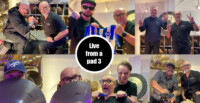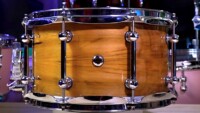Depping on seven different shows before scoring his own resident drum chair at only 21 years of age certainly put this months feature drummer on the list of the youngest, most in-demand West End drummers ever. Now, just over a decade later, he is an institution in London’s musical theatre scene:
Doug Harper
Book of Mormon – Blue Man Group – Mamma Mia – Dirty Dancing – Legally Blonde – Charlie and the Chocolate Factory – Joseph – Wicked – Hair – Grease – Sister Act
 Starting off on trumpet in the local brass band, eight year old Doug Harper would use every tea break to sneak behind the drums. His teacher, trying to stop the noise during the breaks, offered Doug his first drum lessons in exchange for the silence and he fell in love with the instrument straight away.
Starting off on trumpet in the local brass band, eight year old Doug Harper would use every tea break to sneak behind the drums. His teacher, trying to stop the noise during the breaks, offered Doug his first drum lessons in exchange for the silence and he fell in love with the instrument straight away.
Years later he found himself playing percussion in the National Youth Orchestra when one of his tutors picked up on his talent and invited him to audition at the Wells School in Somerset. He got in and spent the next eight years learning all varieties of musical styles in both percussion and drums while playing with a ton of different bands and orchestras. This versatility and experience in following a conductor soon came in handy.
After that, Harper joined the Guildhall School of Music in London as a percussionist but spent most of his time there practising drums. Somewhat leaving percussion behind, work as a drummer soon started to come in but it was a text from his sister that provided the first nudge towards the West End…
Outside of the West End Doug is also an in-demand session drummer having played and toured with the likes of Rick Astley, All Saints, Gloria Gaynor, Sheridan Smith, Bryan Adams – to name a few – and is the drummer for the hugely successful orchestra/band Rogue Symphony. In the studio he has recorded with The Wanted, Susan Boyle and can even be heard on the latest Mission Impossible movie ‘Fallout’.
He also runs his own recording studio from which he works on his own music and offers drum recording to clients all over the world.
How did you start getting work in the West End?
My sister saw an advert in the stage newspaper that said they were looking for drummers for the London production of Blue Man Group and told me to send in my CV. I did but heard nothing back for a while. Then out of the blue I got a phone call inviting me to do an audition. The show was already up and running but they seemed to need a cover drummer when people were off. I had to learn the whole show off by heart, there were no charts. The show had about four drummers on it that rotated around different nights of the week and one of them was a guy called James Powell. He basically taught me the whole show. I did that show for about a year but it started getting in the way of college. So I left college and just hoped I would get some more work in.
Shortly before Blue Man Group closed James went on to do Joseph, the Andrew Lloyd Webber thing. He needed deps on that and got me in. I was lucky that James was such a well respected drummer and recommended me to a lot of people who needed deps, so before I knew it I was doing seven shows… “Oh right, that’s what I’m doing then!”.
Even knowing when I left school that I had all these different skills that you need for musical theatre, I never really thought I want to be a West End drummer. I was doing it before I even really realised.
When I was 21 I took over on Hairspray from Andy McGlasson. He was one of the guys James had put me in touch with. I had depped for him on the show for about a year and when he left they asked me to take over.
 What are the main challenges of playing in musical theatre?
What are the main challenges of playing in musical theatre?
I think one of the main things I found challenging is actually interpreting drum charts to create what people might want. I’m trying to find a way of saying this without going “You’re not writing charts correctly” but that’s basically what is happening. Sometimes they write something they think they want, you play something different and they go “Yes, that’s what I want!”. So yeah, it can be quite hard to interpret charts correctly.
Some shows are heavily written out (for example Hamilton) and it’s all about playing exactly that – whereas in Book of Mormon it’s more “play something like this but what you think it should be”.
Knowing how to interpret your MD as well. Some MD’s conduct ahead of the beat to compensate for monitor delays and when you look at them directly you need to take that into account. Then you have cover MDs in and you need to know what parts they conduct in a particular way. That can be tricky.
The third thing would be would be knowing as many different types of music as you possibly can. I guess when you have your own show all you need to know is that show; but if you’re moving around as a dept playing lots of different shows, it’s really important. You don’t have to be a master in every single one of those but you do have to have some knowledge of big band, rock, pop, hip hop and so on. It’s definitely a key skill. Even on Book of Mormon there are about 6 or 7 different styles of music throughout the show.
So yes: interpreting charts, interpreting conductors and interpreting styles. It’s all interpretation. Basically: trying to guess it right.
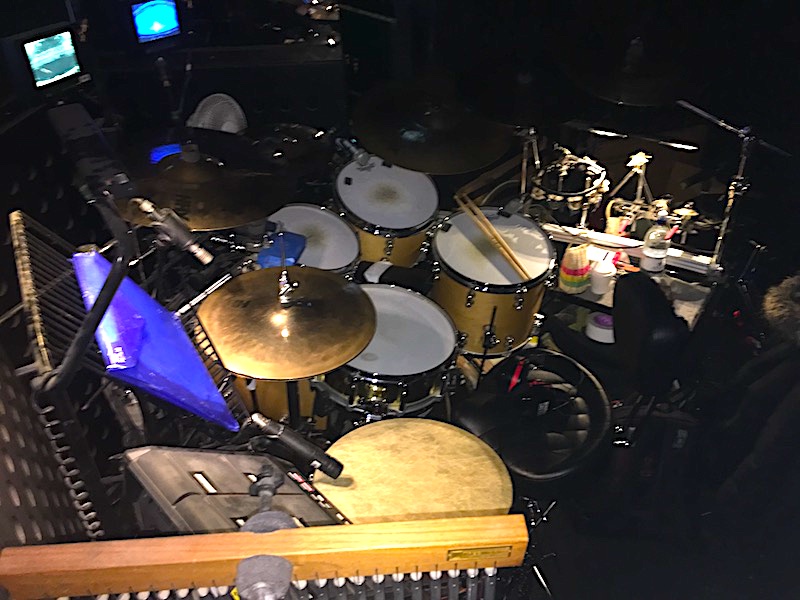 A lot of drummers won’t be used to working with a conductor. What are the challenges there?
A lot of drummers won’t be used to working with a conductor. What are the challenges there?
There are two types of MD’s/conductors in the West End. There is either what we call a ‘Keys MD’ which is a musical director who is sat down playing a piano or keyboard and doing all the conducting with either one hand or his head. On the other hand you have a sort of old-school orchestral conductor where you have someone stood up, not playing an instrument, with a baton doing the full on thing. They’re kind of similar skills but there are different elements to each one.
With a keys MD there will be a lot of nodding and you have to interpret very quickly where they place their nod in comparison to where they place their hands. Ideally you’d have a nod that hits the bottom at the exact moment they play but sometimes it’s a bit out. That can be a bit tricky to interpret but once you know where they do it, you know to either play a bit before or behind. It’s the same with following a stick conductor as well. If it’s a really orchestral type show the chances are the orchestral players won’t be playing where the flick of the wrist is (and that is not meant as a criticism). They play behind. It’s just an orchestral thing – it’s perfectly behind.
At Book of Mormon a lot of the tunes are to click, so most of me being conducted is just waiting for a “…3,4” to start a song. Then the click is going and we all just follow that.
A challenge with following a stick conductor is whether they might be trying to move you tempo-wise or if they’re just trying to move everyone else. There is a lot of movement when somebody gives it the full standing up conducting thing so you can’t follow it exactly because it would go to bits. You need to be watching it, taking in the information and then process which bits of it to follow and which to ignore. That’s where having solid time, and being very confident that you have solid time, is very important. That only comes from practising to a click.
It’s something that I think you can only get better at by doing it and learning on the job. I didn’t have ‘how to follow a conductor’ classes, I just had the experience at school and therefor knew how it worked. I think you should grab any opportunity to experience working with a conductor.
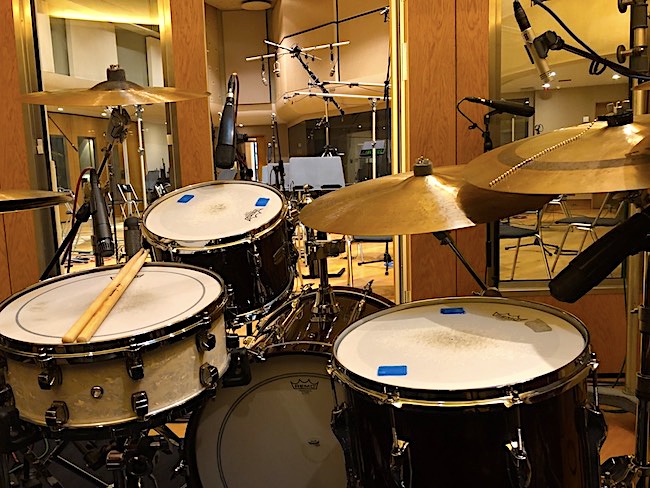 What’s your advice for players who want to prepare themselves for working in musical theatre?
What’s your advice for players who want to prepare themselves for working in musical theatre?
If you want to be a dep, get as many different styles down as you can. Being a dep on shows is the way most peoples careers in the West End start out. There are very few guys that get booked on a gig before doing any sort of depping.
Also go and sit in with guys. I don’t mind people coming to sit in with me. I’m there playing the show, if someone wants to come and sit next to me to watch it all and can take something away from that then that’s great. That will also give you an idea of: A) the level you’ll need to be at; and B) the different genres you need to know. If you’re going to see Mary Poppins that’s a very different skillset than Wicked or Hamilton. They all have their different things. If you want to start your career by coming in as a dept then ideally you need to be convincing in all those different ways.
Being able to play with a click is becoming more and more essential as well. There are still shows where they ‘like to let it breath’ but a lot of shows move to clicks for various reasons.
Another advice I would give is that if your main aim is to do West End stuff, don’t neglect all the other sides of the business because even if you get your own show, it could last six months, close and you don’t have another one for another year. You might dep on some shows during that time but you also might want to take on a pop gig for three months or something like that. Just so you’re not relying on shows alone. Don’t get me wrong, shows are a very steady way to make an income but they can also be pulled from under you at any moment.
Talking about all the depping and seeing it as a way into the industry it’s actually important to know that in London there is a small pool of deps that cover all the shows. There aren’t five different deps on each show. There are maybe ten guys who do all the shows. If there was five for each show, that just shouldn’t be enough to make a living. When I started out I ended up depping on six or seven shows. I sometimes played nine or ten shows a week because they had different matinee days. If you can do that as a dep you can make some serious money.
It’s important to know that it’s all not as big as people might think. There is not an endless amount of shows but if you become one of those trusted people then the world is your oyster.
 What was the hardest show you’ve ever played – and why?
What was the hardest show you’ve ever played – and why?
I think I have to say the most challenging one was Blue Man Group – but I guess that doesn’t really count so much as a musical. It’s less musical theatre and more crazy rock percussion madness. The biggest challenge was that the drummer kind of acted as the MD during the show because you had to watch what the three blue men were doing on stage. They would do a certain thing and you had to play a specific drum fill to cue the band into the next section of music. You really had to stay switched on for the whole show. It was also 100% from beginning to end energy-wise.
Musical theatre wise Book of Mormon is probably the trickiest I’ve ever done. It’s now the easiest because I’ve played it for four years but it’s definitely one of the hardest just because you’re triggering click tracks, you’re setting off percussion loops and you’re playing sound effects that need to happen for the jokes on stage to work. From that point of view it’s quite tricky. Musically there are a lot of different styles going on too which you all have to play on the one drum kit. It can be very tricky to make it all sound authentic.
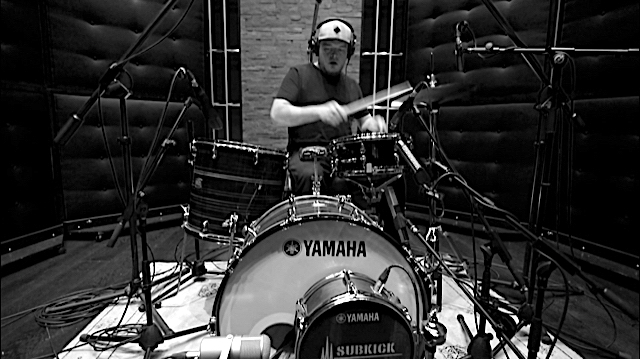 How important is it to have a solid knowledge beyond ‘just’ the drum set? For example percussion, tuned percussion or electronics.
How important is it to have a solid knowledge beyond ‘just’ the drum set? For example percussion, tuned percussion or electronics.
It’s helpful but not essential and all depends on the show.
On Book of Mormon I’m technically playing percussion as well but it’s a bit of djembe and a couple of triangle tings. There is no tuned percussion, no timpani, none of that. There are shows where it’s 50/50 and there are shows where it’s 80% percussion and 20% drums. There are guys out there who do both very well.
Again, if you want to dep on shows that have a lot of percussion then you need to know how to play percussion.
Electronics wise there is usually somebody who programs things for you. On Book of Mormon we have an SPDSX that is all programmed up. Whenever it needs replacing they just reload the stuff in. I do do other gigs that involve electronics though and yes, it is becoming a lot more useful if you know how to do those things.
 You play eight shows a week. How do you keep it fresh and interesting for yourself?
You play eight shows a week. How do you keep it fresh and interesting for yourself?
I’m quite a creative musician and I like variety and being able to open up as a drummer so there is a variety of ways I combat the “eight-shows-a-week-monotony”. One thing is to try and take at least one or two shows a week off to do other gigs.
The other way I deal with it is to try and practise during the day. If there is a day where all I have to do is the show at 7.30 in the evening, I quite often go to my studio and do at least 1-2 hours of practise – or at least playing and messing around.
Another creative outlet is me trying to write my own music which I treat more as a hobby rather than thinking I’ll make a living as an original fusion music writer!
The biggest thing helping me playing Book of Mormon is that I’ve been allowed to interpret it in my own way. I pretty much play my version of it every night. 90% of it is near enough the same every night but it’s my version – and that’s great. I’ve seen some of the other shows – I’ve covered on tour and I’ve sat in on it on Broadway – and it’s great to see how that drummer interpreted it. There were bits where I was totally blown away by how different it is to what I play. That doesn’t mean one is better than the other; it’s just what you get when you have a different group of musicians putting on a show that has some room for interpretation.
 How does being on stage compare to being in a pit?
How does being on stage compare to being in a pit?
I guess there are perks to each. Sitting in a pit you get less back from the audience. They’re giving it but they’re giving it to the actors on stage. Sitting in the pit you can’t see the audience. That’s definitely a downside. Being on stage you tend to give more because of the energy you get back from the audience. That doesn’t mean Book of Mormon doesn’t sound good because we’re in a pit – it sounds exactly the same every night – but me going a bit more crazy doesn’t really effect what’s going out front.
How has technology changed working in the West End?
Click tracks are now a big part of the West End. You even have some shows that run Ableton and things like that. On Book of Mormon I just have a SPDSX which has click tracks, percussion loops and some sound effects on it. There is a different patch for every number in the show. There are a few numbers that aren’t on click but that’s maybe three out of the sixteen. Other shows are much more electronics heavy.
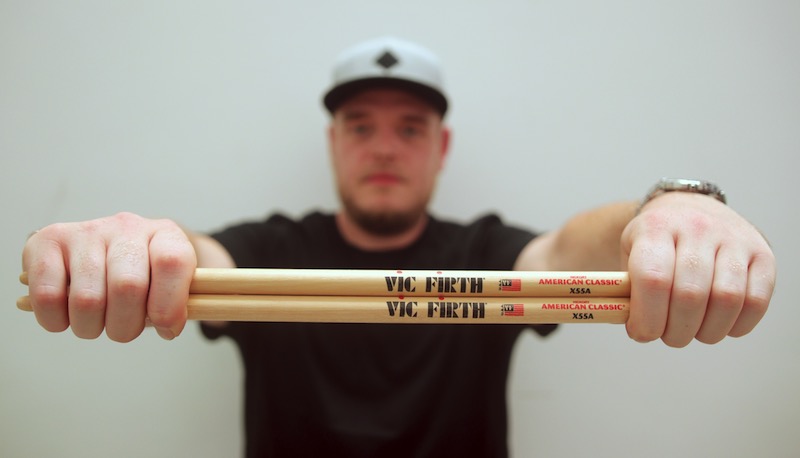 You don’t really have to know everything about electronics – as long as you know which one to hit. That’s about as far as my knowledge goes.
You don’t really have to know everything about electronics – as long as you know which one to hit. That’s about as far as my knowledge goes.
One downside of the new technology is actually in the monitor screens we have. There is a camera on the conductor and I have a screen in my booth so I can see him better. When the MD put his hands down and you looked at him directly and at the screen, you could see it was exactly at the same time. Now with the new fancy digital monitors there is actually a little delay. It’s minimal but you can see it. Our MD knows that so he deliberately conducts slightly ahead of where we’re playing so it looks in-time on the screen. But then there are bits where I’m looking at him directly and he is still of course conducting ahead. That’s a challenge.
Thanks a lot for your time Doug!
Interview by Tobias Miorin
January 2020


